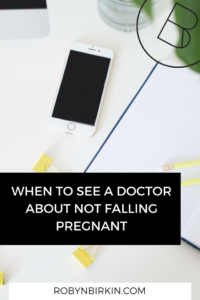Today’s post is all about when to go in to see the doctor about not falling pregnant.
Do you know what my answer is?
Before you even start trying to conceive.
I think you should go to the doctor straight away and the reason for this is that before you start trying to conceive a baby, and I’m guessing that everybody here who is reading has already either been to see the doctor or has missed that boat. But before you start trying to have a baby, you can go to the doctors and get some basic tests, like an iron test, and some STD checks, and a vitamin D test. Sometimes there are really really simple things that could be preventing us from falling pregnant that a general practitioner, OBGYN, or someone could pick up really easily, and rectify really easily.
I don’t know about you, but I think that infertility sucks.
Not being able to fall pregnant absolutely sucks.
The first month that we were trying, I was so convinced that it would happen.
I went to see a doctor before I started trying and I went to see a naturopath before I started trying.
I think this is the right thing to do because if you want to fast track falling pregnant, then you want to make sure that you are optimising your chances of falling pregnant. So certainly for me, I did the right thing in this regard, but there are many of you out there who probably didn’t do that, and what if there was something really really simple that you could change that would prevent that what happened next for me on my journey?
What happened next on my journey was that the second month went by and I was like, “Oh, why isn’t this working?”
The third month went by and I was like, “I’m pretty sure that this would’ve worked by now.
By now, I thought this would’ve happened for me.” Then the fourth month, and the fifth month, and the sixth month, and it was scratch your head, “Why is this not happening for me?” kind of stuff. Every month, my emotions got lower, and lower, and lower, and I could not understand what was happening, and I felt devastated.
Let’s assume that you have not gone to the doctors at all yet about not falling pregnant.
I would advise you to go to the doctors and say, “Are there a few simple tests that you can run like my iron levels, my vitamin D levels, and an STD check? Because I am starting to try to fall pregnant and it’s not happening.”
Then let’s say you get those tests or you’re super proactive, you’ve had those tests before you started trying. Good on you.
When do I next recommend that you go to see a doctor? Six months.
If you’ve been trying without any success for six months, then I recommend that you go back to the doctor. So many of us out there, and the reason why I created this post, is because there are so many people who wait years to go to see a doctor, and I just think that is the hardest thing in the world. Infertility has been shown to be as stressful as a cancer diagnosis and I couldn’t understand why you would wait. Please don’t do that to yourself.
I don’t recommend you wait any longer than six months and some of you might be like, “Hold up, what?” Because the guidelines say to wait 12 months before you go to see someone and that is true, but I also think that at six months sometimes there might be able to be one or two really simple tests that they might start running.
If you are over 35, the guideline is not to wait any longer than six months because the clock starts ticking rapidly between 35 and the age of 40.
If you are 40 years old, I would absolutely recommend just go to the doctor straight away to start running a few preliminary tests because you want to start ruling things out. When it comes to testing for infertility, often it is a ruling things out scenario that often they want to say, “Okay, well it’s not this. It’s not this. It’s not this.” Because there’s not often … it’s such a new science. The first IVF cycle was only ever done in 1987, so you can think of how old the oldest IVF child is and how different the science is now to what it would have been in 1987 as well, but there is still so much that they don’t know. But it really comes down to a process of elimination, and a process of checking the boxes, and saying, “Okay, well it’s not that. It’s not that. It’s not that.”
If you go to the doctors after six months, let’s assume that you are under 35, that you already went, and had your iron levels and your vitamin D levels checked, they might be able to do just a simple sperm analysis on your partner. When I went at about the 12 month period, which is the guideline of what they said, the doctor said to me, and this is why I recommend everyone goes and just chats to the doctor at six months and says it’s not happening. Because the doctor said to me that in their clinic, in the GP clinic, there were a few preliminary tests that they could run, like just checking at the second half of your cycle what your progesterone levels were doing and sometimes just checking where your hormones were at at different times of the month or just doing a simple sperm test for your husband. I didn’t know that. But because I had already been trying for 12 months, I was referred directly to a fertility specialist clinic.
So absolutely, the worst that can happen if you go to see a doctor at six months time is the doctor will say, “Keep trying.” The new slogan for the Royal College of General Practitioners, which is like the normal Doctor that you go to every day here in Australia, is something like, “Your partner in life.” That’s because they can also help you with strategies for coping with things emotionally too and it doesn’t always involve drugs. It might be a referral to a counsellor. It might be just a few strategies and things like that. But if you are struggling at six months, and it’s not happening for you, and you don’t know what to do, because that’s kind of how I felt at six months, just a little bit hopeless, then just go to the GP, because the worst that can happen is that they will tell you to keep trying and come back another time. But more than likely, there might be one or two more tests that they can run. If you haven’t been to the doctor to just check basic things like your iron and vitamin D levels then that’s something that they can do at that point.
Then you get to the point of you’ve been trying for 12 months. You’re under 35. Nothing is happening. Don’t wait is my advice.
Go to the doctor. Get a referral to a specialist. You can if you’re in the United States go to see your OBGYN. I do always still recommend, if you can, going to see a fertility specialist because a fertility specialist does this day in and day out. They know what they’re looking for and OBGYN is quite often dealing with pregnancy, not necessarily infertility, but a specialist is dealing primarily with infertility. Go and get a referral to a fertility specialist. A hot tip is sometimes it takes a couple of months to get into a fertility specialist. When you get into a fertility specialist and have an appointment, then you have the test, and sometimes it’s always a process of waiting, and waiting, and waiting for the next thing, and then waiting for another appointment, which could take a couple of months. So you always want to be sort of one step ahead.
You might have been waiting or trying for 10 months and then you go to see the doctor in advanced notice or you might just call the fertility clinic and ask what their waiting list is. But the essence of what I’m trying to say here is be proactive. I’m a super type A person as I am guessing from this podcast you can tell, but that’s fine if you want to be casual, but don’t wait for three years only to discover that there might be a serious problem in the fertility arena that has been for three years causing you distress, and heartache, and a cost of fertility tests, and things like that because there’s something that you need to rectify as soon as possible.
It’s like wasted time with a biological clock that is ticking.

Listen here.
